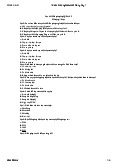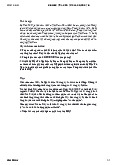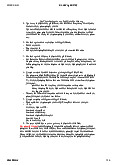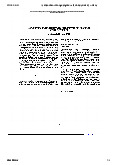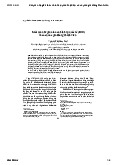



















Preview text:
19:04 1/8/24 Magoosh+ Ielts+Vocabulary+PDF IELTS Vocabulary PDF About this PDF
Vocabulary is a very important part of the IELTS. It’s also important to understand that
each section of the IELTS requires different vocabulary. In this PDF, we’ll list vocabulary
words for the Listening, Reading, Writing, and Speaking sections. Within each of the
four sections of the PDF, we’ll look at vocabulary words that deal with different topics.
We’ll also look at structure vocabulary: transitions, introductory words, words that
describe quantity or change, and so on. How to use this PDF
The Magoosh IELTS Vocabulary PDF highlights a wide variety of IELTS vocabulary.
The focus is on vocabulary words for specific subject areas and purposes. This PDF is
not meant to be a full list of all of the most common IELTS words. For that, you’ll want to
check out Magoosh’s IELTS vocabulary flashcards.
You can think of this document as a companion to the longer set of vocabulary words in
Magoosh’s IELTS Flashcard decks. The flashcards help you drill with a large number of
words. Then, this PDF gives you guidance on how these words are used to discuss
certain ideas or serve certain functions. about:blank 1/37 19:04 1/8/24 Magoosh+ Ielts+Vocabulary+PDF 1 TABLE OF CONTENTS
IELTS Listening Vocabulary Work 2 Travel and Places 3 Family 5 School Life 6
IELTS Reading Vocabulary
Vocabulary in Context Strategies 10 The Academic Word List 11
Special Focus: Environment and Life Science Words 12
IELTS Writing Vocabulary General Training Task 1 15 Academic Task 1 15 Academic Task 2 17
IELTS Speaking Vocabulary
Giving and Getting information 21 Common Questions 23
Transitions for IELTS Speaking 24
Vocabulary for Common Speaking Topics 26 About the Authors 36 ielts.magoosh.com about:blank 2/37 19:04 1/8/24 Magoosh+ Ielts+Vocabulary+PDF 2 IELTS Listening
IELTS Listening deals with a variety of subjects. But IELTS listening topics all have one
thing in common: they involve conversational English vocabulary.
In fact, most IELTS listening audio tracks are conversations. But even IELTS Listening
speeches have some conversational language; they’re spoken as if they’re being given to a live audience.
Perhaps the most common topics in IELTS Listening are work, travel, family, and school
life. Below is some common vocabulary within these topics. Work
Work is a common topic in IELTS listening. Here are a few useful work-related vocabulary words: career
someone does, and suggests a long-term commitment. To help you understand
the difference between occupation and career, I will tell you about my career and
the occupations I’ve had in it. I have a career as an educator. My current
occupation in this career is a Test Expert position here at Magoosh. As a part-
time occupation, I am also a language tutor. And earlier in my education career, I
was occupied (the verb form of occupation) as a middle school teacher, and then as a university professor. shift work
time. A shift at a workplace often lasts 8 hours, but can be shorter. Shift work is
usually paid on an hourly basis. salary work
Salary work may have an expected schedule, a shift where the worker will
normally be at work. But the schedule and hours per day for salary work are not
as strictly controlled. A salary worker may have to work much longer hours than
usual on a given day, or come in on the weekends. Sometimes, however, a
salary worker’s situation is the opposite. A salary worker may also work shorter
hours and have more freedom to leave the workplace during their normally
scheduled shifts. Salary workers aren’t paid by the hour and instead receive a
fixed rate of pay per week or month. ielts.magoosh.com about:blank 3/37 19:04 1/8/24 Magoosh+ Ielts+Vocabulary+PDF 3 unskilled/skilled
Unskilled work is work that requires little or no training, such as fry cook work at a
fast food restaurant, or work cleaning and maintaining buildings. Skilled work
does require training. Some workers are so highly skilled that they have doctoral
degrees 4 lawyers and doctors for examples. Other skilled occupations require
less training. Skilled work as a plumber, computer programmer, or automotive
repairman may only require a four-year degree, a two-year degree, or an even shorter certification. manual labour
physical activity. Manual labour jobs include unskilled work such as stocking
shelves at a grocery store, and skilled work such as welding. Travel and Places
Travel and locations are commonly discussed in IELTS Listening conversations, and in
some IELTS Listening solo speeches. accommodation
On the IELTS, you live. This use is especially likely to come up in IELTS Speaking, where you
may be asked to describe the accommodation you live in. In travel conversations,
often heard on IELTS Speaking audio tracks, places people stay while they are travelling, places such as hotels, inns, and hostels. transport
aren’t walking. In IELTS conversations, there will be talk about long distance
transport, such as trains and airplanes taken to holiday destinations. There will
also be discussion of transport within a town or neighbourhood, such as the use
of a car, bicycle, scooter, or bus to get to work, school, or the supermarket. city centre
The city centre is the business district found in the middle of a city. Sometimes
this centre is also referred to as ielts.magoosh.com about:blank 4/37 19:04 1/8/24 Magoosh+ Ielts+Vocabulary+PDF 4 main square
The business district outside of the city centre. Examples of famous main squares
around the world include Times Square in New York City and Tiananmen Square in Beijing. attractions
In IELTS conversations about travel and places, attractions, interesting places that travelers like to visit. high rise
A are especially common in and around the main square of a city centre. storey
A high rise building generally has more than 10 storeys, and may have dozens of
storeys, more than a hundred storeys in extreme cases. In IELTS conversations,
people also may talk about the number of storeys in their personal
accommodation, with phrases such as building.= traditional/quaint
The words towns, neighbourhoods, houses, and other locations that look place is traditional or quaint if its characteristics are associated with a past time period. character
A home, community, town, or location is said to have interesting place that is different from other places. This word has a positive connotation
4 a positive feeling or sense. If a place has character, it is special in an enjoyable way. ielts.magoosh.com about:blank 5/37 19:04 1/8/24 Magoosh+ Ielts+Vocabulary+PDF 5 Family
English has a variety of words for different kinds of family members. You’ll need to hear
and recognize a whole bunch of different English family words in IELTS Listening. Immediate family spouse a husband or wife sibling a brother or sister sibling rivalry
a feeling of competition between siblings (This is a possible topic not just in
Listening, but also in the IELTS Speaking Interview, and possibly in IELTS Writing Task 2.) Extended family aunt
the sister of your father or mother uncle
the brother of your father or mother cousin
the son or daughter of your aunt or uncle niece
the daughter of your brother or sister nephew
the son of your brother or sister ielts.magoosh.com about:blank 6/37 19:04 1/8/24 Magoosh+ Ielts+Vocabulary+PDF 6 in-laws
relatives of your spouse. Your spouse’s brother is your brother-in-law, your
spouse’s sister is your sister-in-law, your spouse’s mother is your mother-in-law,
your spouse’s father is your father-in-law, and so on.
Less common family words
The family terms below are unlikely to come up in IELTS Listening tracks. Still, there is
at least some chance you’ll hear this vocabulary on the exam. Study this short list of
not-so-common English family words, and you’ll be ready for them if they come up on the test. step
Just as relatives from previous marriages. For example, if a man marries a woman who
already has children, he becomes their step father, and they become his step
children. And if both a husband and wife have children from their previous
marriages, those children become each others’ step siblings.
great grandparents (great grandmother and great grandfather)
the parents of your grandparents
great grandchildren
the children of your grandchildren School Life
As I mentioned before, school life vocabulary is pretty common in IELTS Listening.
School-related words on the IELTS are usually related to university life, rather than life
in elementary school, middle school, or finishing college. For a roundup of common
higher education vocabulary from the IELTS Listening Section, read on! counsellor
When students have problems or feel stress, they can meet with a counsellor. At
university, counsellors provide advice and assistance to students. They help
students with challenges in school and in their personal lives. As the term is used
on the IELTS, a university counsellor is both an academic adviser and a psychological therapist. ielts.magoosh.com about:blank 7/37 19:04 1/8/24 Magoosh+ Ielts+Vocabulary+PDF 7 administrator
An administrator is a person on campus who manages a department or a
programme. In IELTS listening, you may hear a speaker identify themselves as a
university administrator. Or you may read a short passage discussing the role of
a specific administrator in a university programme. office hours
University staff members may have office hours. These are scheduled when a
faculty member is able to see students. For example, a professor might keep
office hours on Tuesdays and Thursdays from noon to 2p.m. During those
scheduled two-hour time periods, students could come see the professor, even if
they didn’t have an appointment. centre
A centre is a physical place on a campus where specific university tasks and
activities happen. For instance, a university might have a plant biology research
centre. In such a centre, the biology of plants is studied and researched. And
some universities also have a counselling centre, a specific location on campus
where students can see counsellors. A centre can be an entire building (as many
research centres are), or it can be a room or office complex within a building (as
is common for university counselling centres). service
At a university, a service is a kind of help that is available to students and others
on campus. One service that’s often mentioned on the IELTS is information
technology (IT) services. computers and computer programs. Other common campus services that may be
mentioned on the IELTS include dining services and yes3counselling services.
(The IELTS really does love to talk about counselling and counsellors.) institute
When you hear or read the word "institute" on the IELTS, it will almost always
refer to an entire university. the exam. ielts.magoosh.com about:blank 8/37 19:04 1/8/24 Magoosh+ Ielts+Vocabulary+PDF 8 course
This is one of the most common words on the IELTS. This may seem like a very
simple vocabulary word. But many IELTS test-takers get confused. It’s easy to
forget that this word can have two meanings. A that a student enrolls in, such as a one-semester history course. However, on the
IELTS, a course can sometimes also refer to an entire degree. A bachelor’s
degree can be called a four-year course, and a master’s or doctorate may be
described as a postgraduate course.
Note that in North American English, a course is almost always just one class.
But of course, the IELTS is a U.K.-based exam. Test-takers who are less familiar
with British English should be careful when they see this vocabulary word on the IELTS. module
A module usually refers to a unit within an individual semester course. A module
will always have a specific focus. A general psychology class might have one
module on developmental psychology, another module on abnormal psychology, and so on. workshop
A special project or develop a special skill. A workshop can be part of a semester
course. However, on the IELTS, workshop usually refers to a learning activity
that is not part of a regular university class. Instead, workshop will often refer to a
learning activity hosted by a counselling centre or an academic conference. tutorial
On the IELTS, a students. A tutorial could be a single lesson on the use of symbolism in a famous
novel. Or a tutorial could teach students on how to use a certain computer
program. You get the idea. A tutorial could be one session in a semester course,
a one-on-one meeting with a tutor, or a learning activity that is directed by a
student club or university support centre.
Here again, we see an IELTS vocabulary word that is different in British and
North American English. In American contexts, instructional video or booklet. ielts.magoosh.com about:blank 9/37 19:04 1/8/24 Magoosh+ Ielts+Vocabulary+PDF 9 sit
Like IELTS talks about university learning, to sit is to complete a course or exam. If
someone fails a course or exam, the IELTS might say that they need to course or exam. ielts.magoosh.com about:blank 10/37 19:04 1/8/24 Magoosh+ Ielts+Vocabulary+PDF 10 IELTS Reading
The IELTS Reading section features the most advanced vocabulary on the test. You’ll
see a lot of unfamiliar, highly specialized vocabulary for different academic subjects.
You may wonder, have to know all of the advanced academic vocabulary you see on IELTS Reading. Allow me to explain.
Vocabulary-in-Context Strategies for IELTS Reading
Knowing high-level vocabulary certainly helps you in IELTS Reading. But IELTS
Reading isn’t just a test of your English vocabulary. It also tests your ability to read
passages strategically. To successfully navigate IELTS Reading vocabulary, you need
to make educated guesses at the meanings of new, unfamiliar words. You also need to
be able to guess that the meaning of challenging sentences, paragraphs, and
passages, even when you don’t understand all the words.
No matter how many IELTS vocabulary words you study, you will come across words
you don’t know on the IELTS, especially in the IELTS Reading section. Below are some
strategies you can use when that happens.
Looking at the word form
Prefixes appear at the beginning of words and can help you guess a word’s meaning.
Take for example, the IELTS Reading vocabulary word can be used on its own as a preposition, so this word may describe the position of something.
Suffixes hint at both the meaning of a word and its part of speech. Take the IELTS
Reading word academic study or discipline. This word is probably the name of a science. Looking at context
Prefixes and suffixes are useful, but sometimes misleading. Look at have? Suppose that the IELTS Reading paragraph with the word ielts.magoosh.com about:blank 11/37 19:04 1/8/24 Magoosh+ Ielts+Vocabulary+PDF 11
about things found on the ground. In that case, you can know that the meaning probably
is prepositional. Similarly, the suffix <-ate= in the word of nouns, verbs, or adjectives. Again, context is key. In the IELTS Reading phrase
between a subject (deep sea bacteria) and an object (temperatures). You can guess
that the word Context can help you understand unfamiliar root words too. You may encounter an
IELTS Reading sentence with the word about rocks and stones. Through context, you’d be able to guess that stone. You already know that <-ology= means a field of study. Combine the likely
meaning of the root word with the suffix, and you have learned a new word through context. Ignoring the word
If you are still feeling need to simply passage. To practice this strategy, read IELTS passages and other English academic
writing. As you read, cross out or delete words that seem like they may not be
necessary. Then reread the passage without those words. If the meaning has changed,
put a few words back in, to make sure the meaning stays the same as the original.
This kind of practice helps you tell the difference between important and unimportant
words. Unimportant words on the IELTS can be ignored easily. More important words
can still be ignored too, if you carefully watch for other word forms, grammar, and context. The Academic Word List
So you don’t necessarily need to know every specialized word for every academic
discipline. But what about academic words that appear in many different IELTS Reading
passages, regardless of topic?
It certainly can be useful to study academic words that appear across many different
subjects. And there is a word list for that. It’s called the Academic Word List. If you look
up this list on Google (or another search engine of your choice), you’ll find many
different wordlists and activities taken form the original Academic Word List. ielts.magoosh.com about:blank 12/37 19:04 1/8/24 Magoosh+ Ielts+Vocabulary+PDF 12
The original Academic Word List is huge, with nearly 600 root words, and thousands of
words total. Here is a good overview of the AWL. And don’t worry4you don’t need to
memorize every word on the list in order to score high in IELTS Reading. Just study the
list to get a feel for the kinds of words you’re most likely to see in IELTS Reading
passages. (It’s also worth noting that Magoosh’s IELTS Vocabulary Flashcards contain many words from the AWL.)
Special Focus: Environment and Life Science Vocabulary
Now, I did tell you that you don’t need to memorize all of the specialized words that
you’ll see in IELTS Reading. However, it is still helpful to look at a few common words
from the most common topics in IELTS Reading passages.
I’m talking about the environment and life sciences. The IELTS loves these two closely-
related topics. Below are some environment/life science words you are likely to see
somewhere in the Reading section. environment
You probably already have a general idea of what don’t, the title of this post may be a little confusing. To be clear, refers to all the physical parts of the natural world. By this, I mean the world that
is not deliberately created by humans. The environment is the air we breathe, the
water found in nature, and the land where wild animals and plants grow. In the
life sciences, the man-made parts of the world are studied carefully to see how they affect the environment. pollution
harm it. Pollution includes smoke form cars and factories, garbage that is
dumped into the forests or oceans, oil spills, that sort of thing. Many different
IELTS Reading passages will mention pollution, even if the articles don’t focus on life sciences. erosion
Sometimes dirt or sand get removed from the surface of the earth by wind or
water. This removal of dirt and sand is called environment. If dirt washes or blows away, plants will die off, and the
environment will change. Human activities can often cause erosion. Humans can also work to prevent erosion. ielts.magoosh.com about:blank 13/37 19:04 1/8/24 Magoosh+ Ielts+Vocabulary+PDF 13 habitat
A habitat can be seen as a small part of the environment. Habitats are specific
places where certain plants, animals, or other living things are found. A fish’s
habitat is water. Some kinds of fish have a seawater habitat, while others have a
fresh water habitat. Cacti live in dry desert habitats. Each living thing has its own
special habitat. Life science texts on the IELTS look at the way that pollution can change or threaten habitats. agriculture
Agriculture is a formal academic word for production of anything that can come from a farm: fruit, vegetables, meat, milk,
and the like. On the IELTS, agriculture is nearly always discussed in terms of
how it affects the environment. sustainable
IELTS passages will talk about whether or not a human activity is A sustainable activity is one that will not damage the environment, and will not
use up all of a resource. The use of oil as fuel is criticized as unsustainable;
eventually we will use up all the oil stored in the earth. Moreover, drilling for oil
and burning oil for energy both hurt the environment. emissions
environment. IELTS passages sometimes look at emissions created by human
activity, such as smoke emissions from cars and trucks, or the emission of
carbon dioxide (a gas that causes climate change). flora and fauna
fauna refers to animals. Think of a flower and a fawn (a baby deer). These two
words will always go together in the fixed phrase are not truly English. Instead, these words are borrowed from Latin. This
confuses many test-takers. Now that you know this phrase, you don’t have to be
confused when you see it on the IELTS. mammal
Mammals are animals that have fur (or hair) and have warm blood. Female
mammals make milk that they feed to their babies. Mammals include dogs, cats,
humans, etc. Most3but not all3mammals give live birth. There are a few egg-
laying mammals in existence too. ielts.magoosh.com about:blank 14/37 19:04 1/8/24 Magoosh+ Ielts+Vocabulary+PDF 14 reptiles
While mammals are warm-blooded (able to regulate their own body
temperature), reptiles are cold-blooded. This means that the temperature of a
reptile’s body is strongly influenced by the air temperature immediately outside of
the reptile’s body. The reptile group of animals also have scales and no hair or
fur. Common reptiles include turtles, lizards, and snakes. species
A species is a very specific type of living thing. Mammals and reptiles are not in
the same species because these are large categories of very different animals.
Dogs and turtles aren’t in the same species either because there is still a lot of
variation between these types of animals. For a type of animal to qualify as a
species, it must be able to mate with other animals of its kind and produce babies
that are the same kind of animal. Humans are a species, and so are3for
instance3individual types of snakes or dogs, such as the timberwolf or the coral
snake. There are plant species too, like the Giant Redwood tree, or the tiger lily.
These plants can cross pollinate and reproduce with each other, but not with other species of plants. evolve
survive. Individual species of animals and plants evolve over long periods of
time3millions of years. The way the human brain has slowly gotten bigger over
thousands of generations is an example of a way that humans have evolved.
With a larger brain comes higher intelligence and a better ability to survive. cell
A cell is a tiny living thing, so small it can only be seen with a microscope. Every
cell has a thin skin that protects it, called a membrane. The membrane can take
in food for the cell. Each cell is controlled by a nucleus, a kind of tiny simple brain
in the middle of a cell. Cells can be part of a larger living thing. Every part of an
animal or plant’s body is made up of tiny cells. A cell can also be an independent
living thing. An ameba is an example of an organism (living thing) that has just one cell. soil
Soil is sometimes called under our feet that plants grow out of. Worms, rabbits, and other hole-digging
animals stay in or under the soil. ielts.magoosh.com about:blank 15/37 19:04 1/8/24 Magoosh+ Ielts+Vocabulary+PDF 15 IELTS Writing
The IELTS Writing Section has two tasks.
IELTS General Training and IELTS Academic have two different versions of Task 1.
The first General Training Writing Task requires test-takers to write a letter, email,
memo, or other short piece of business communication. IELTS Academic Writing Task 1
is an essay that describes the information found in a detailed chart, table, or graph.
IELTS Academic Writing Task 2 is the same on both versions of the exam. In IELTS
Academic and IELTS General training, the second writing task is a personal opinion essay about a social issue.
IELTS General Training Task 1 Vocabulary
For IELTS General Training, the vocabulary is pretty much the same as the
conversational vocabulary I showed you for IELTS Listening, earlier in this PDF.
Basically, you create a short written piece of a conversation: an email to a co-worker, a
letter to a friend, instructions for a colleague, and so on.
For IELTS Academic Writing Task 1 and IELTS Writing Task 2, there are a number of
specialized vocabulary words that you should know and use.
IELTS Academic Writing Task 1 Vocabulary
In IELTS Academic Writing Task 1, you should use the graph, chart or table for the task. True to their name, reporting verbs help you report
information that has been given.
Reporting verbs are introductory phrases in IELTS Writing Task 1; they introduce new
pieces of information that you take from the task’s infographic.
Introductory Verbs for IELTS Academic Writing Task 1
The table illustrates the trends in…
The chart reveals information about the changes in…
The bar graph provides the differences between…
The line graph presents
how X has changed over a period of…
According to the pie chart… ielts.magoosh.com about:blank 16/37 19:04 1/8/24 Magoosh+ Ielts+Vocabulary+PDF 16
The graphic clearly shows that…
As the chart indicates…
The table reveals that…
Adverbs for the First IELTS Academic Essay
You will also need to use adverbs in this first essay for Academic IELTS. In this essay,
adverbs help express a relation of place, time, circumstance, manner, cause, and
degree, and can greatly add some color and interest to your writing as well as show off
your range of vocabulary. Some great ones to use in the IELTS writing include: approximately dramatically exactly specifically roughly abruptly dramatically gradually markedly significantly slightly slowly steadily
IELTS Academic Writing Task 1: Using Synonyms for Variety
Again using a variety of nouns and verbs for words like rise and fall will help increase
your overall score. Look at the next page for some suggestions: ielts.magoosh.com about:blank 17/37 19:04 1/8/24 Magoosh+ Ielts+Vocabulary+PDF 17
Vocabulary for IELTS Writing Task 2
For the second IELTS Writing Task, the important vocabulary is all about transitions.
The most common purpose of Writing Task 2 transitions is to: give opinions add new information
compare and contrast ideas
make conditional statements give examples describe results
Here is a list of some useful vocabulary words for each of these six transition types: ielts.magoosh.com about:blank 18/37 19:04 1/8/24 Magoosh+ Ielts+Vocabulary+PDF 18 ielts.magoosh.com about:blank 19/37 19:04 1/8/24 Magoosh+ Ielts+Vocabulary+PDF 19 ielts.magoosh.com about:blank 20/37
